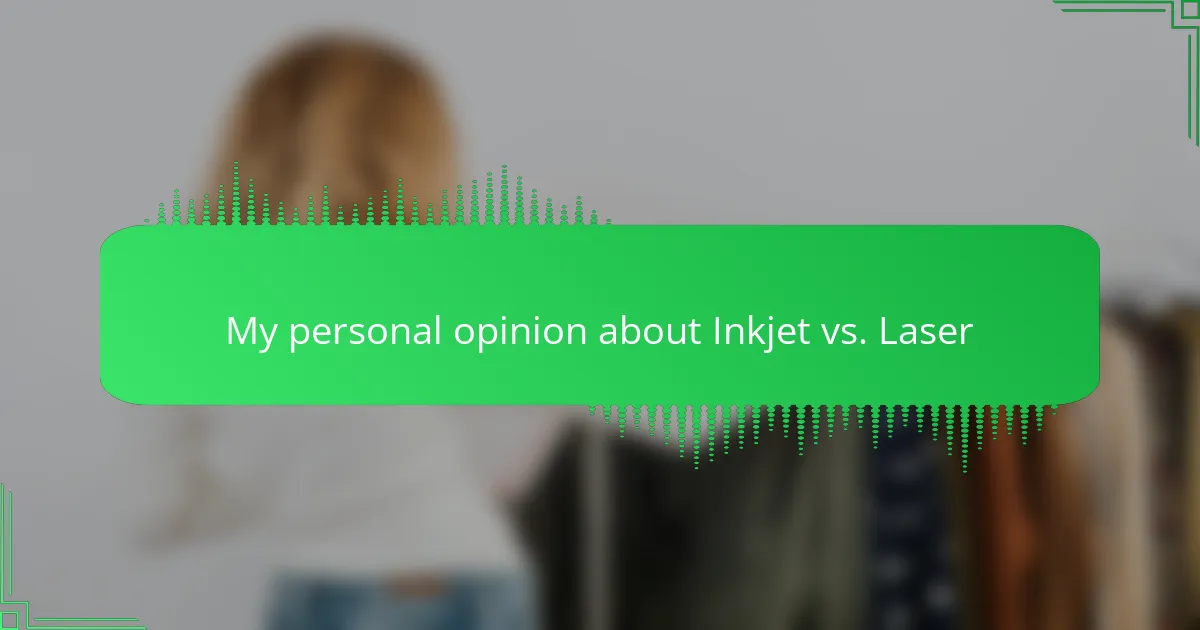Key takeaways
- Inkjet printing is ideal for vibrant, detailed designs with smooth color gradients, making it suitable for custom t-shirt artwork.
- Laser printing offers speed and durability, producing sharp, strong designs that withstand multiple washes and are efficient for bulk orders.
- While inkjet printers are cost-effective for small runs, laser printers save money over time for larger production due to longer-lasting toner.
- Choosing between inkjet and laser involves balancing the richness of color versus the need for speed and durability in t-shirt printing.
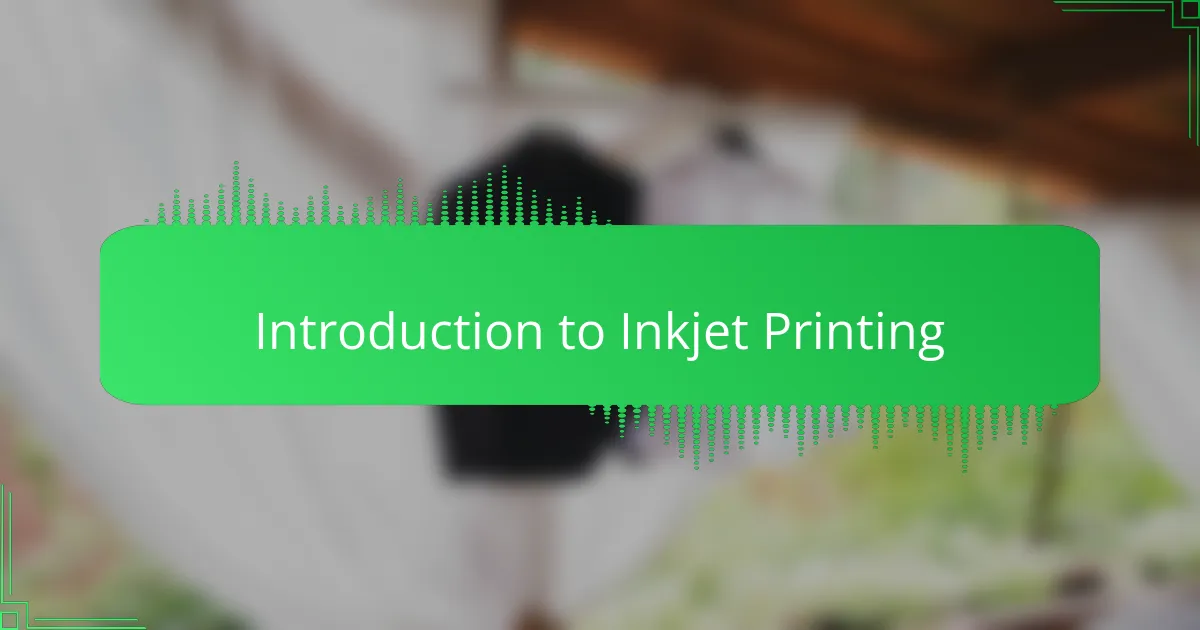
Introduction to Inkjet Printing
Inkjet printing has always struck me as a wonderfully versatile method, especially when it comes to capturing vibrant colors on t-shirts. From my experience, the way inkjet printers spray tiny droplets of ink directly onto fabric allows for incredibly detailed and colorful designs that really pop.
One thing I appreciate about inkjet printing is its ability to handle complex images with smooth gradients and subtle shading. This makes it perfect for artists like me who want to translate intricate digital artwork into wearable designs without losing any nuance.
- Uses tiny nozzles to spray ink droplets onto fabric
- Excels at producing vibrant colors and fine details
- Ideal for complex images with gradients and shading
- Often preferred for short runs and custom designs
- Uses water-based inks that soak into the fabric rather than sitting on top
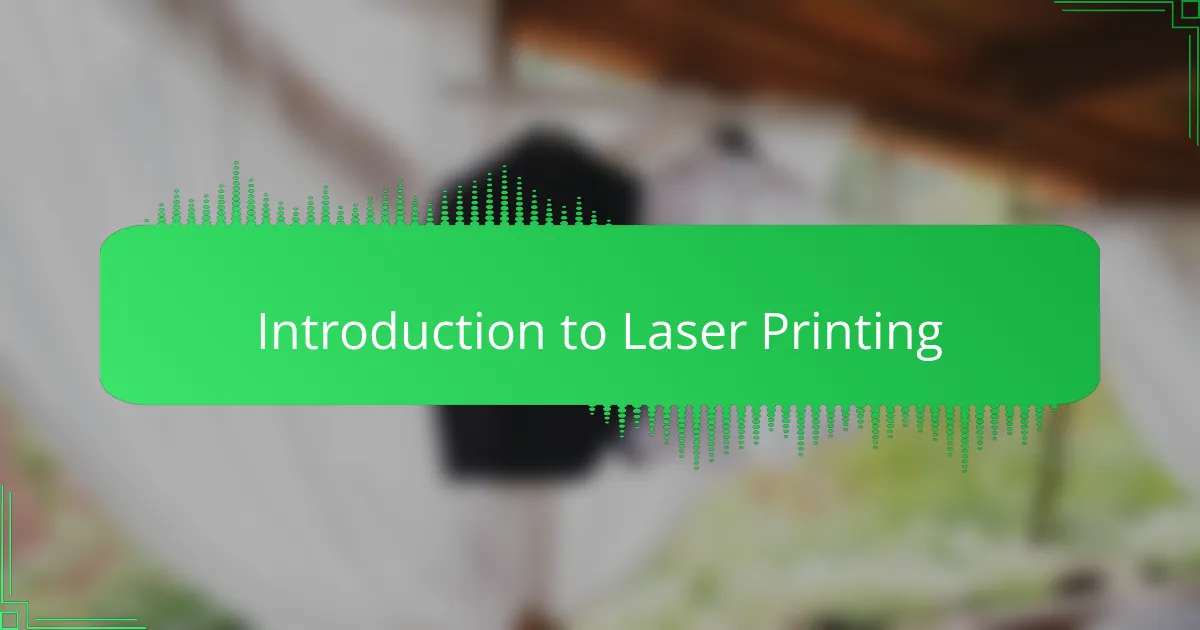
Introduction to Laser Printing
Laser printing felt like a game-changer to me when I first encountered it in the world of t-shirt design. Instead of spraying ink, it uses a laser beam to fuse toner powder onto the fabric, creating designs that are crisp and clean. I was curious how this technology, more common in office printers, would stand up to the demands of textile printing.
One thing I immediately noticed is how laser printing delivers sharp lines and bold colors that don’t smudge or run, which gave me confidence in producing more durable designs. Have you ever had a print fade or blur after a few washes? Laser printing’s heat-based process seemed like a solid answer to that problem. It’s fascinating how the toner bonds so tightly with the fabric, making it resilient under regular wear and tear.
Though it’s not always the go-to for designs with subtle color gradients, I found laser printing’s speed and precision appealing, especially for larger batches of shirts. It made me think differently about balancing quality with quantity in my projects—sometimes fast and bold is exactly what a design needs.
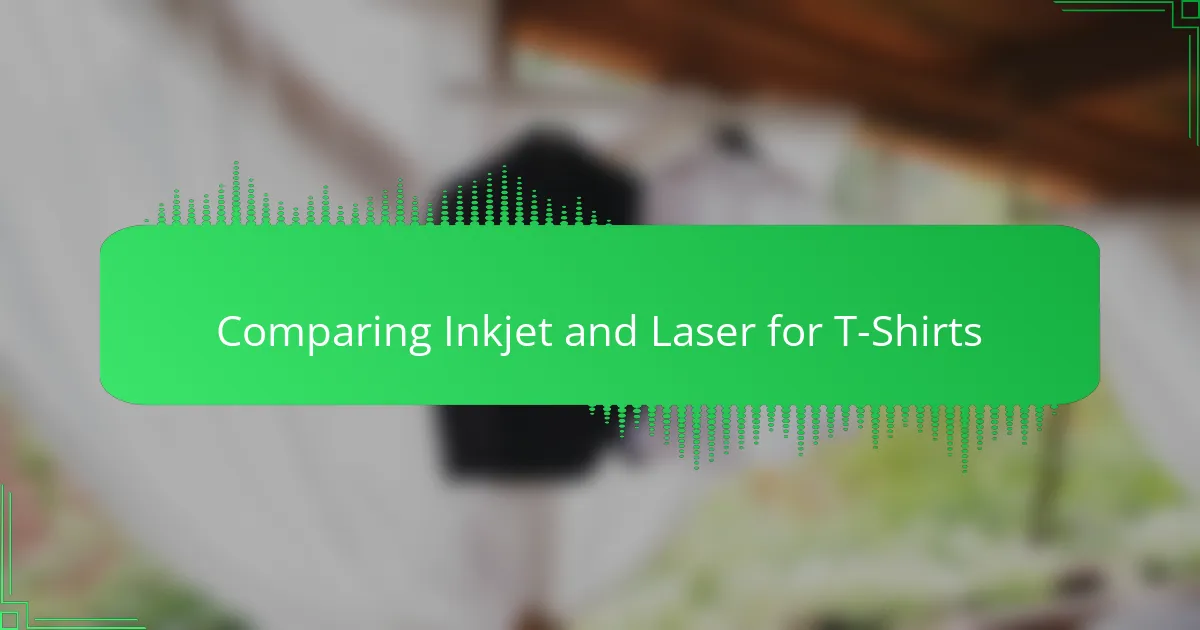
Comparing Inkjet and Laser for T-Shirts
Comparing Inkjet and Laser for T-Shirts has always been a topic I find quite intriguing. Inkjet printers, with their ability to blend colors smoothly, often give more vibrant and detailed designs, which I love when creating intricate T-shirt graphics. However, laser printers tend to be faster and more durable, which I’ve found crucial when producing large batches without sacrificing quality.
| Aspect | Inkjet | Laser |
|---|---|---|
| Color Quality | Rich, vibrant, ideal for detailed designs | Good, but sometimes less vibrant compared to inkjet |
| Print Speed | Slower, especially on high-resolution prints | Faster, suitable for bulk production |
| Durability | May fade faster with washing | More durable, holds up better over time |
| Cost | Lower upfront but ink can be expensive | Higher initial cost but toner lasts longer |
| Best Use | Small runs, highly detailed and colorful designs | Large runs, simpler designs with bulk efficiency |
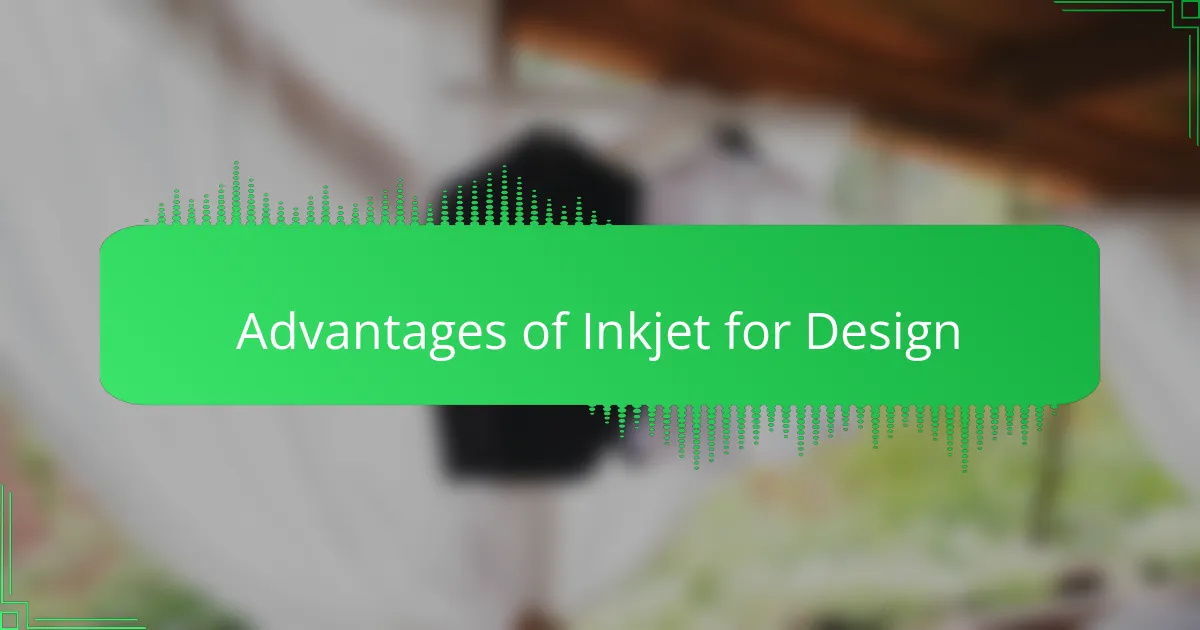
Advantages of Inkjet for Design
Inkjet printers have always felt like the artist’s tool to me, especially when it comes to t-shirt design. The way they handle colors is simply unmatched, offering vibrant, rich hues that really bring designs to life. I’ve found that inkjets excel at capturing delicate gradients and intricate details, which is crucial for custom shirts where every shade counts.
| Feature | Inkjet Advantage |
|---|---|
| Color Vibrancy | Produces rich, vivid colors ideal for detailed designs |
| Detail Precision | Excellent for fine details and smooth gradients |
| Cost of Setup | Lower initial cost compared to laser printers |
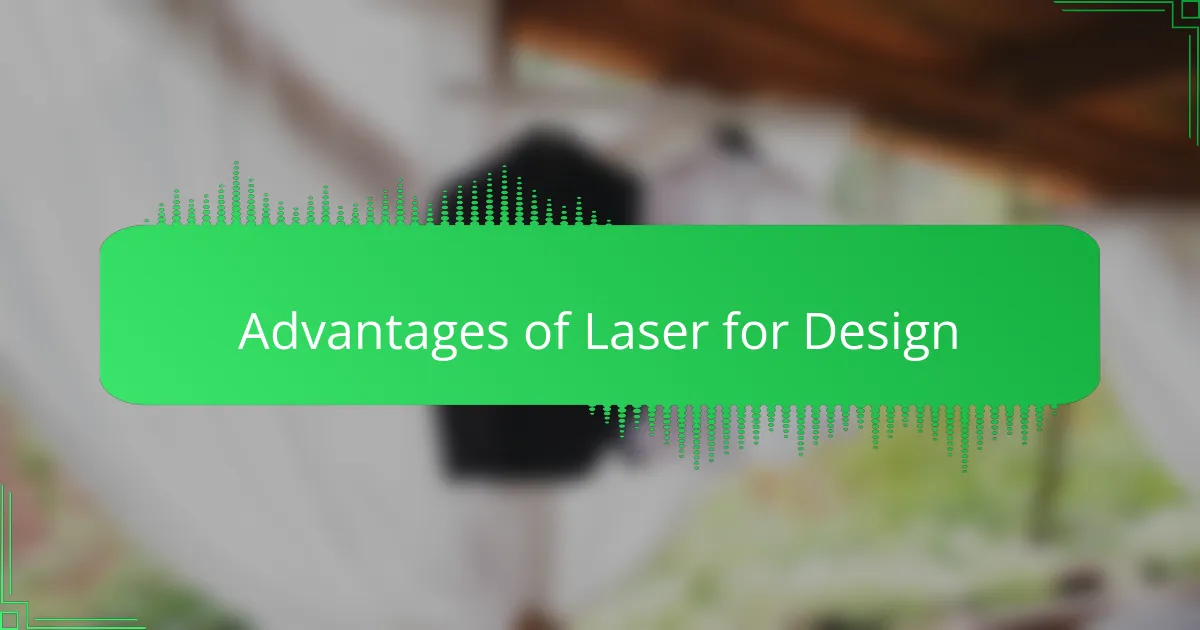
Advantages of Laser for Design
Laser printing has always stood out to me for its remarkable speed and precision. When I’m working on intricate t-shirt designs, the crisp lines and consistent output of laser printers make a big difference. The durability of laser prints also gives me peace of mind, knowing my designs will endure multiple washes without fading.
| Feature | Laser Printing Advantages |
|---|---|
| Print Quality | Sharp, precise lines perfect for detailed designs |
| Speed | Faster printing, ideal for bulk t-shirt production |
| Durability | Prints resistant to smudging and fading over time |
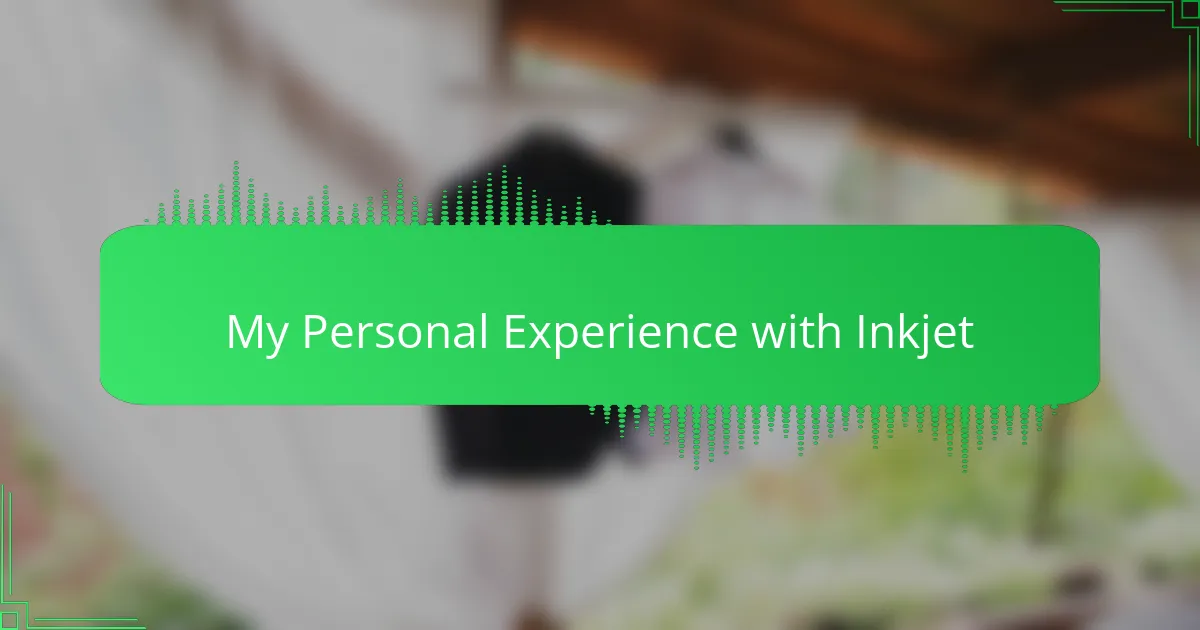
My Personal Experience with Inkjet
I’ve spent quite some time using inkjet printers for t-shirt design, and honestly, the vibrant colors they produce never fail to impress me. There’s something satisfying about watching detailed, high-resolution images slowly come to life on fabric, especially when working on custom, intricate designs. However, I’ve noticed that inkjet prints tend to be less durable over time, which has sometimes frustrated me, especially when customers expect long-lasting wear.
| Aspect | Inkjet Experience |
|---|---|
| Color Quality | Vibrant and precise, great for detailed images |
| Durability | Less resistant to washing and fading compared to laser prints |
| Cost | Initial cost is low, but ink cartridges can be expensive |
| Speed | Slower printing process, especially for high-quality images |
| Ease of Use | User-friendly, ideal for small batches and custom prints |

My Personal Experience with Laser
Using laser printing for t-shirt design has been quite the eye-opener for me. I remember the first time I saw a laser-printed shirt; the sharpness of the lines and the durability really stood out—no smudging or fading even after multiple washes. It made me wonder, why hadn’t I trusted laser technology sooner for those batch orders demanding both speed and toughness?
What surprised me most was how quickly I could produce large runs without sacrificing quality. The precision feels almost mechanical, but I appreciate that reliability when deadlines are tight. Have you ever needed a solid, no-fuss print that just holds up? That’s exactly what laser printing gave me, and honestly, it changed how I plan my projects.
Of course, not everything was perfect—sometimes I missed the richer color vibrancy I got from inkjets. But when durability and efficiency are the priorities, laser printing’s heat-fused toner process really shines. It’s like having a dependable workhorse in my printing toolkit, especially when crisp, bold designs are the goal.
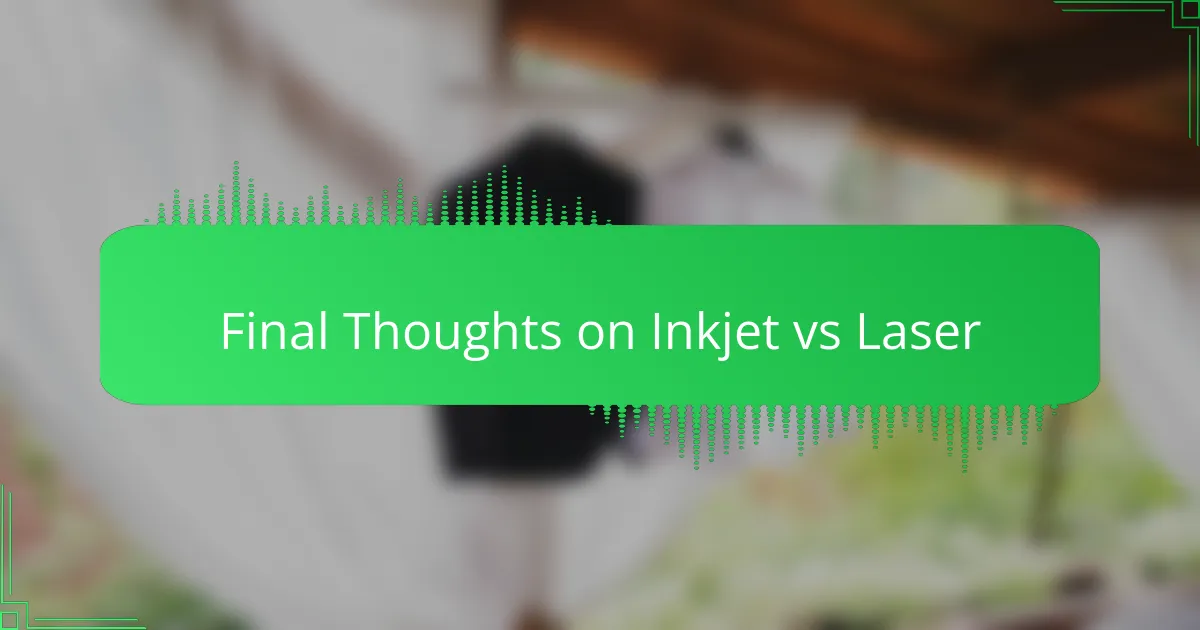
Final Thoughts on Inkjet vs Laser
| Inkjet | Laser |
|---|---|
| Produces vibrant colors ideal for complex t-shirt designs | Better for high-volume, fast printing with durable results |
| Can be more affordable for small batches or custom prints | Higher upfront cost but cost-effective over time on large orders |
| Ink can sometimes smudge if not handled carefully | Prints are crisp and less prone to smudging |
| Requires frequent maintenance like ink cartridge replacements | Generally lower maintenance with toner cartridges |
When I started experimenting with t-shirt designs, I vividly remember how the rich, vibrant output from inkjet printers won me over for detailed, colorful artwork. However, as orders increased, the speed and consistency of laser printing became indispensable, even though I missed some of that color depth. Balancing between expressive creativity and practical efficiency is where my heart lies in this inkjet versus laser debate.
